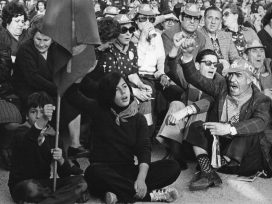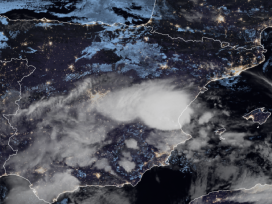Much has been made of the fact that the leaders of Podemos are all teachers of political science. However, no one knows quite what significance to attribute to this observation. Are they sorcerers’ apprentices treating Spain as a gigantic piece of fieldwork, heralds of a new form of professionalized politics, modern-day Quixotes who dream not of tomes of Chivalric romance but of international journals with a high impact factor? Simultaneously, minor intellectual disputes have arisen over their theoretical orientation: are they Gramscians or not? Some commentators argue that such characterizations and classifications are of no importance at this point, it would be more relevant to pay attention to what Podemos do over and above what they think.

Citizens’ Assembly “Sí Se Puede” [Yes We Can] organized by Podemos; 19 October 2014, Palacio Vistalegre, Madrid. Photo: Daniel López García. Source:Flickr
It would nevertheless be a mistake to disregard Podemos’s theoretical roots as a curiosity of no importance. There is, to begin with, the pure intellectual pleasure of working out what they are, so that we can then observe the development of the group with one eye still on its foundations. Beyond that, however, it is also the case that rarely have we seen such an exact correspondence between theory and practice in our political system, to the extent that the latter cannot be understood without the former; it is, in effect, a theory
oriented towards praxis. This is demonstrated in a presentation by Iñigo Errejón, number three in the party, made as part of a masters course in politics at the UNED, Spain’s distance-learning university. The presentation is available on
YouTube. His exposition is brilliant, although – for anyone aware of his intellectual sources – in no way original. One can see, all the same, just why Spain’s major parties feel so wrong-footed: their mentality is one of large-scale, consolidated corporations, but it has been shaken by an agile start-up breaking on to the scene and changing the market in which they all compete. We used to go to the Corte Inglés department store; now we prefer to shop online.
This said, what are the sources on which Podemos has fed? Beyond that, what relation is there between their intellectual base and their political practice? If we want a rapid outline of their principle influences, we have to speak of a theoretical itinerary that begins with Antonio Gramsci, continues on to Ernesto Laclau and Chantal Mouffe – who were in turn influenced by Jacques Derrida and even Carl Schmitt –, makes a stop at Jacques Rancière, flirts with Slavoj Zizek and at every point is sustained by the “framing theory” that, from psychology to sociology, plays a crucial role in all current explanations of social movements. And, if we want to reduce all this to a simple formula, we can resort to Victor Hugo’s famous remark, according to which one can stop an army, but not an idea whose time has come. Hugo was right, but forgot to add that ideas are not born in a vacuum, nor do they propagate themselves spontaneously. A fundamental premise of Podemos is the essential need to drive forward and promote certain ideas, to bring them into general circulation whenever the opportunity presents itself, in order to change the perceptions of ordinary citizens as the first phase in a broader project of social transformation.
Needless to add, it is not exactly a novelty to say that perception is a determining factor in life, or that language is a constitutive element in reality as we perceive it. We have known this since Plato, and were reminded of it by Machiavelli. However, over the years, western philosophy has considerably refined the vocabulary used to describe the relationship between words and things, giving ever more attention to the processes through which certain ways of perceiving reality move from the margins to the centre of society, and incorporating into its analysis not just the creation of images by the state but also their germination within society as a whole. Hugo’s old idea, now transformed into a “frame”.
This means that there are no fixed meanings but, instead, society is constituted at any point in time by a set of power relationships that have crystallized around a particular organization of reality, that have accrued and become naturalized with the passing of time, and is presented as if it were inevitable and not contingent. Such is the central thesis of the Argentinian thinker Ernesto Laclau, for whom the social order is a discourse, that is, a body of practices and meanings, the content of which is not stable but fluid, because their import depends on relationships that are by definition dynamic, between different classes and groups. Hence society is always open, though in a sense different from that of Karl Popper. It is the role of politics to place the existing order in question, by showing that nothing within it is a matter of necessity; thus Laclau is post-Marxist, because he asserts the primacy of the political and not the economic. This is the step that Gramsci did not go so far as to take when he developed his concept of hegemony, now reformulated by Laclau himself and Chantal Mouffe. Together, Laclau and Mouffe demonstrate that the inter-group alliances that have the capacity to alter this falsely natural order of things do not correspond to rigid class divisions. This is something that is visible in the varied sociological profile of the potential electorate of Podemos, and which equally permits us to underline the role of so-called “subaltern groups”, from women to indigenous communities. New social actors that make it possible to create new coalitions, and thus alter the existing balance of interests.
Pluralism! Exactly. And its theoretical recognition implies an “agonistic” or conflictive conception of politics, as argued by Mouffe, as the channelling of a conflict that consensus – an impossible aspiration – cannot eradicate. In this Mouffe follows Carl Schmitt and his celebrated distinction between friend and enemy, crossed with Derrida’s idea of différance. This being so, the construction of an antagonistic axis, an us against them, is essential if a movement is to form identities, which nevertheless, precisely because of the same fluidity of meaning, are not definitive by nature. In the context of this “agonistic democracy”, populism is understood, as in Laclau, as a social logic rather than as a specific ideology. It is a fundamentally democratic logic, in that the construction of the people is seen as the central task of all modern politics. From this point of view, populism becomes one form of the struggle for hegemony, through which demands previously seen as marginal are politicized and made universal, to form part of the ordinary vocabulary of all political actors. Hence from the very moment when Podemos’s rivals began using the term casta – “caste”, the vague label that Podemos uses incessantly to stigmatize Spain’s established political and financial elites, of all parties –, they granted it a victory, because from then on they have had to do battle with alien metaphors, which are creating a different reality through language.
On this point, the relationship between Podemos and earlier social protest movements is especially relevant, since real political change only becomes possible after the insurgent politics developed by such movements has prepared the ground. In the lecture referred to earlier, Errejón spoke explicitly of the “crack” opened by the 15M anti-austerity movement in May 2011, the moment when “a breakdown in established interpretations” occurred that opened the way to new hegemonic possibilities. It is certainly true that contemporary theory on social movements has tended to characterize them as agents of persuasion that carry on a war of meanings regarding social reality, seeking to modify the majority’s understanding of particular matters. Instead of framing a smoking chimney as a symbol of progress, seeing it as pollution; reinterpreting an eviction as a public problem rather than a private drama; and so on. As Zizek says: everything is ideology. That is, reality depends on the way we see reality. This radical constructivism, we should say in passing, may well explain the difficulties these populist movements face when attempting to translate their “desire for change” into economic advances worthy of the name.
There are many other aspects of the Podemos phenomenon – such as its powerful emotional dimension – that deserve attention; similarly, its theoretical base warrants a thorough critique. However, I have only sought here to present some of these intellectual foundations, those especially relevant for a party of politicologists. Most of all because they include, as we have seen, an instruction manual for gaining access to power, and a programme of resignification that has as its nucleus the desanctification of the existing constitutional regime, portrayed by Pablo Iglesias et al. as a contingent arrangement that has been considered “natural” for far too long. If previously, we did not have an agonistic democracy, we certainly have one now. A war – over meanings, over resources, over power – is underway. It is therefore of interest to know that the generals are thinking.







